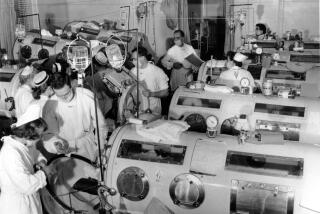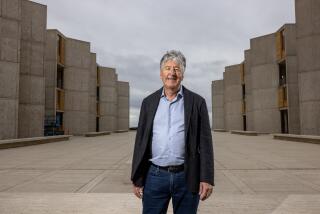Salk Says He Intends to Test Vaccine for AIDS on Himself
- Share via
Dr. Jonas Salk, famous for developing a vaccine for polio, said in a report published Thursday that he would inject himself with an experimental AIDS vaccine before the end of the year.
“I want to answer the implicit question, ‘Would you take it yourself?’ ” Salk, 76, told the San Diego Union. “Since actions speak louder than words, that’s the obvious thing to do.”
Salk, who recently attended an AIDS conference in Florence, Italy, was in Paris and unavailable for comment.
A spokeswoman for the Salk Institute in La Jolla said the flood of calls after Salk’s comments were published were referred to the Immune Response Corp. of Carlsbad, which Salk, a current board member and shareholder, co-founded in 1986 to search for an AIDS vaccine.
Steven Basta, a spokesman for the firm, said Salk’s comments “overemphasized something that’s not a primary focus. . . . Our focus is to target the already-infected AIDS population. . . . The other matter (a vaccine for an uninfected population) is not what we spend our time thinking about.”
But Basta conceded that if a vaccine for an uninfected population is tested--and the company has applied for state health department permission to begin such testing--Salk would be one of several volunteers on whom the vaccine would be administered.
“The trial for an AIDS vaccine, to be used on uninfected patients, is not about to start, and at this point, is only a maybe, anyway,” Basta said.
He said that when the vaccine is tested, Salk would “be injected with a killed virus vaccine. That would be similar to what he did in the past with an influenza vaccine. Such a practice has gone on throughout the history of medicine. Physicians and scientists often participate in safety tests to demonstrate confidence in the product.”
Basta said recent tests on monkeys have led to hopes that “an effective vaccine for an uninfected population can be developed based on a killed virus,” similar to one being used on patients already infected with human immunodeficiency virus, which causes AIDS.
“It prompts us to want to explore a vaccine for the uninfected population,” Basta added. “But the critical need we see now is in the 1 million to 2 million already infected patients that will eventually progress to AIDS if there is no new therapy. Our product may prevent those patients from ever developing AIDS.”
More to Read
Sign up for Essential California
The most important California stories and recommendations in your inbox every morning.
You may occasionally receive promotional content from the Los Angeles Times.













